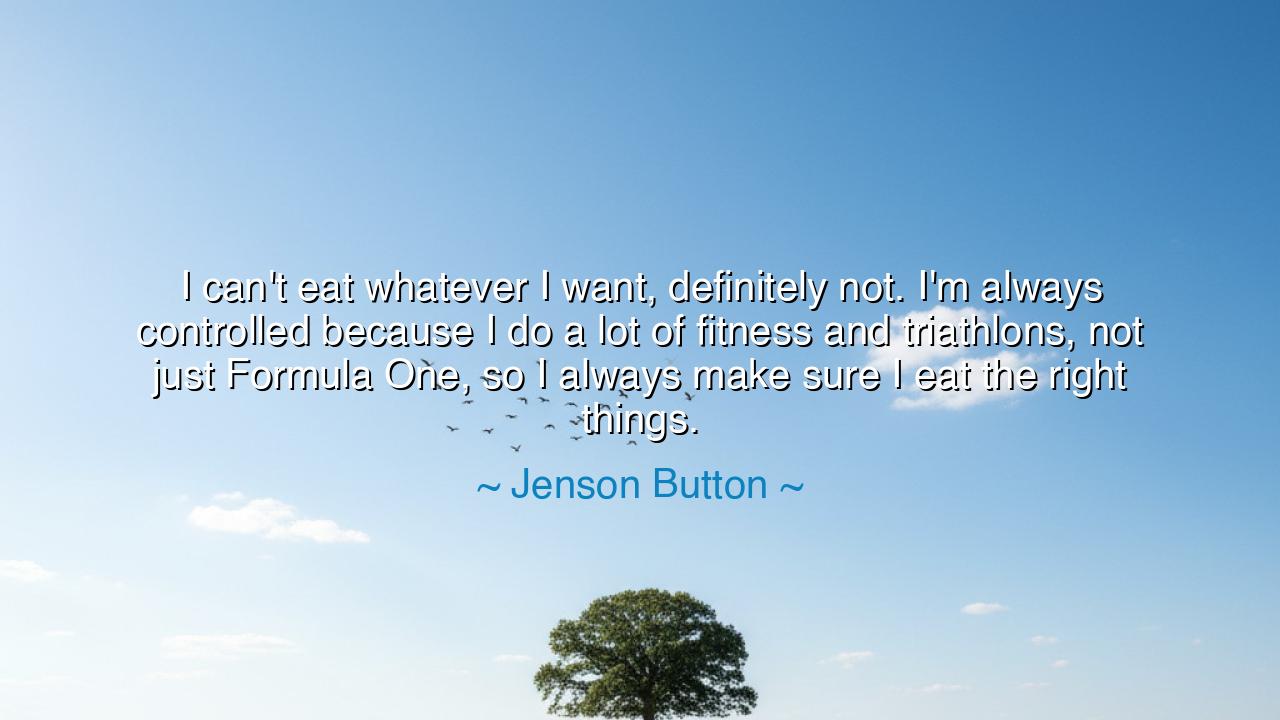
I can't eat whatever I want, definitely not. I'm always
I can't eat whatever I want, definitely not. I'm always controlled because I do a lot of fitness and triathlons, not just Formula One, so I always make sure I eat the right things.






Host: The afternoon sunlight filtered softly through the window, casting gentle rays across the room, as if the world outside had slowed its pace to match the quiet stillness inside. Jack sat by the table, his eyes momentarily lost in thought, while Jeeny stood near the window, her hand resting on the sill, her mind clearly processing the words Jack had just shared. The quote from Jenson Button hung between them like an invitation to explore the balance between discipline, desire, and self-control.
Jeeny: “I’ve been thinking about what Jenson Button said: ‘I can’t eat whatever I want, definitely not. I’m always controlled because I do a lot of fitness and triathlons, not just Formula One, so I always make sure I eat the right things.’ It’s fascinating how he connects fitness and self-control—the way he treats his body like a finely tuned machine, choosing what to fuel it with, based on his goals.”
Jack: “Yeah, it’s a kind of commitment, isn’t it? Not just about the sport, but about the way you have to discipline your entire lifestyle. The idea that what you put into your body directly affects what you get out of it—whether that’s in performance or even in your overall well-being. He’s not just doing triathlons, he’s living a life of balance and control.”
Jeeny: “Exactly. But I think there’s also a tension there, right? The idea that you have to always restrict yourself, always control your desires in order to maintain that balance. It’s not just about eating the right things—it’s about sacrificing certain pleasures or impulses. Button is giving us a glimpse into the world of high-level athletes, where control is essential, but I wonder—how much freedom do you lose when everything is about restraint?”
Host: The silence between them deepened as the idea of control and freedom settled in the room. Jack’s fingers lightly tapped against the table as he absorbed Jeeny’s words, the weight of her question hanging in the air.
Jack: “I see what you mean. On one hand, there’s something admirable about the level of dedication and discipline it takes to maintain that kind of lifestyle, to constantly choose the right things to eat, to train your body in the right way. But on the other hand, is there room for pleasure, for indulgence, for moments when you let go and enjoy life without always considering the consequences? Can you have both?”
Jeeny: “That’s the balance we’re always trying to find, isn’t it? The tension between discipline and freedom. It’s easy to think that we have to be rigid with ourselves in order to achieve something, but I think there’s also value in flexibility. Button may choose to restrict himself, but there’s something important about allowing ourselves the space to enjoy the things that make us feel alive, even if they don’t align with our goals.”
Jack: “So, it’s not about completely abandoning self-discipline, but about giving ourselves permission to enjoy the things we crave without feeling guilty about it?”
Jeeny: “Yes. Life is more than just the end goal—it’s about the journey and how we experience it. Self-control can be incredibly powerful, but we have to remember that living is about more than achieving perfection. It’s about enjoying the moments, the indulgence, without being tied down by guilt or restriction.”
Host: The conversation hung in the air for a moment, the tension between self-control and freedom settling into a quiet reflection. The idea that balance wasn’t about total restriction, but about understanding when to restrain and when to allow liberty, seemed to find its place in the stillness of the room. Jack’s fingers stopped tapping against the table, his thoughts now focusing on the deeper layers of what they had discussed.
Jack: “So, it’s not about either-or—it’s about choosing when to be disciplined and when to let go. Like, we can still choose the right things for our bodies, our health, but we also need to give ourselves permission to enjoy the freedom to live fully, to indulge in the pleasures life offers.”
Jeeny: “Exactly. When we can find that balance—when we learn to listen to our bodies and not just follow rigid rules—we begin to experience both the satisfaction of discipline and the joy of freedom. We can control our choices, but also allow ourselves the space to enjoy life.”
Host: The quiet between them was now one of understanding, a shared recognition that the real challenge wasn’t about either discipline or freedom, but about integrating both into a life that felt authentic and fulfilling. The world outside had grown darker, but inside, the room felt filled with light—a reminder that balance was not only possible, but necessary.






AAdministratorAdministrator
Welcome, honored guests. Please leave a comment, we will respond soon